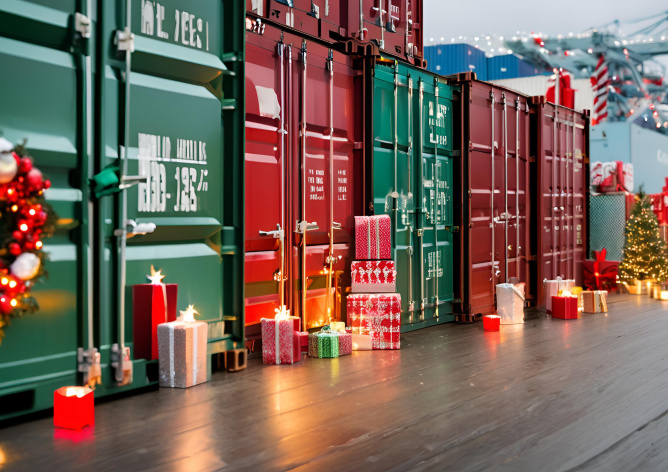Newsletter 19/2024: Actual situation in international transport

Houthi attacks in the Red Sea, the Gaza conflict, restricted traffic in the Panama Canal, strikes by train drivers in Germany, blockades of important transport hubs and cities by disgruntled farmers across Europe (including road links to the port of Hamburg or Zeebrugge), strikes at German airports.
OCEAN TRANSPORT
Obstruction in supply chains persists
Houthi attacks in the Red Sea, the Gaza conflict, restricted traffic in the Panama Canal, strikes by train drivers in Germany, blockades of important transport hubs and cities by disgruntled farmers across Europe (including road links to the port of Hamburg or Zeebrugge), strikes at German airports. This is just a short but far from exhaustive list of factors that have a direct impact on transport time, cost and, most importantly, proper supply chain planning.
Not to mention the impact on the ecology: a ship circumnavigating Africa produces a third more tonnes of CO2 than if the same ship had taken the Suez Canal route.
We do not expect the disruption (and it is certainly not appropriate to use the word chaos) to reach the level of the covid years.
The demand for shipping capacity is by no means extreme, the ports are better able to deal with the potential backlog of ships, nor does the inland transport infrastructure address the same problems as in the covid era. Short-term overcrowding in some ports can of course occur. But freight delivery planning adapts very quickly to extended shipping times. Still, we recommend that deliveries of critical components or goods be consulted in advance to minimize unpleasant surprises or negative impacts in terms of cost and transit time.
Insurance of shipments routed across the Red Sea
Not all container ships sailing on routes between Europe, the Middle East and Asia are diverted to the Cape of Good Hope route. About 20% of ships still use the Suez and Red Sea route. And since all major shipowners are members of maritime alliances, a ship of shipowner X sailing through the Red Sea may be loaded with a container of alliance partner Y or Z. Therefore, care must be taken to ensure that cargo insurance covers the risk of shelling in the Red Sea. Our all risk insurance covers this risk, please contact us if you wish to arrange this insurance.
Export ocean transport
Some shippers are starting to feel a temporary shortage of empty containers at Czech terminals as ships sailing with import cargos are delayed on their way around Africa.
There has not been as much of an increase in prices for export shipments as there has been for import shipments. Shippers reflected the increased cost of circumnavigating Africa in prices.
However, prices to the USA and Mexico, as well as to the ports of call of the Panama Canal, have also increased. Less water in the canal requires ships to have less draught - which means less use of ship space. Some of the containers bound for ports on the West Coast of the US and Canada are unloaded on the East Coast or at ports on the Gulf of Mexico and transported to the West of the US and Canada by rail.
Many shipowners have suspended acceptance of bookings from Hamburg to Jeddah, King Abdullah and other ports that are transshipped in Jeddah (e.g. Aqaba port may be affected),
Possible alternatives are sailing via the ports of Koper or Trieste with several transshipments and therefore a longer and more costly route. Another option is the capacity constrained route via Jebel Ali, where containers are delivered to Jeddah and Aqaba using tractor trailers.

Import shipments from the Far East
For the duration of the holiday season in China, the yachtsmen have as usual announced a series of blank sailings for selected services. Nevertheless, there is a relative abundance of shipping capacity and even a gradual erosion of prices. Only longer shipping times have to be expected.
The Chinese New Year will affect the operation of our offices in China as follows:
China - closed 9/2 - 18/2. Operations will resume 19/2
Vietnam - closed 8/2 - 14/2. Operations will resume on 15/2.
Taiwan - closed 8/2 - 14/2. Will resume operations on 15/2.
Hong Kong - closed 10/2 - 13/2. Will resume operations 14/2.
LCL closings
We are already handling port shipments and containers on a case-by-case basis, taking into account available capacity, readiness of goods and the possibility of customs and documentation clearance.
AIR TRANSPORT
The booking windows for departures ahead of Chinese New Year are slowly closing this week, with bookings expected to be available for departures during the Chinese holiday period only by the end of the week.
Air freight rates have gradually increased due to the Red Sea situation and the upcoming Chinese holiday, but it has been a continuous increase without an extreme spike. A more significant price increase may occur over the next week as customers make last-minute efforts to send out rush shipments before the Chinese holiday.
Already, air service restrictions have been announced with the cancellation of some scheduled flights, yet shipping costs for orders booked before the holiday and departing during the holiday could be lower compared to current costs.
The situation in the export direction remains favourable, with airlines offering ample capacity at attractive prices resulting in a slight 5% increase in global tonnage in week 3 compared to week 2 of January.
Average global rates of $2.35 per kilo in Week 3 are 22 percent below last year's levels, although they remain well above pre-Covid levels, up 32 percent compared to January 2019.
RAIL TRANSPORT
The last departures by rail are planned from Xi'an on 10.2. and 14.2. with an ideal pick-up date of 03.02., later there is a risk of extra costs for the collection at the point of dispatch, as the capacity of drivers is quite busy or there is even a risk of refusal of implementation by the operators just because of the occupancy of capacity.
The start of the regular service after CNY is planned for the end of February and the beginning of March, specifically departure on 29.02 with closing on 22.02, when the goods must be in storage at the terminal. The next date is then March 3 with a closing date of 24.02. when the goods must also be in the operator's warehouse. The departure dates also apply to all-container rail transport.
Confirmation of departures may take slightly longer than usual during Chinese holidays.

CBAM



